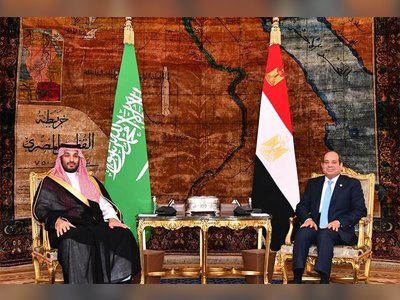The Obsession That Could Divide: GB News and Its Singular Focus on UK Muslims
A new report reveals GB News’ disproportionate coverage of Muslim communities, raising concerns over media ethics and societal impact.
GB News stands at the epicenter of a fresh media controversy, accused of providing nearly half of the news coverage about Muslims in the United Kingdom within a two-year period, as unveiled by a detailed report from the Centre for Media Monitoring (CfMM).
The research, which scrutinized the station’s editorial choices, calls attention to an excessive and predominantly negative focus on Muslim communities.
The report highlights the narrative framing by GB News, which allegedly portrays Islam as not only foreign but antithetical to the British way of life.
Analysts argue that such portrayal could exacerbate social rifts and potentially ignite unrest.
This sentiment was echoed by prominent figures such as Sayeeda Warsi and Stewart Purvis, who have suggested that the findings demand serious introspection from regulators like Ofcom.
One striking revelation is GB News’ staggering seventeen thousand mentions of Muslims or Islam, constituting almost half the coverage by UK news channels.
This is disproportionate compared to the BBC and Sky News.
The report implies that GB News focuses largely on domestic Muslim-related stories, in contrast to its competitors, where international contexts provide broader narratives.
Researchers also contend that the channel frequently casts Muslims as aggressors in societal conflicts—a charge brought to the fore during last summer’s riots, where GB News purportedly contributed to sixty-two percent of the news clips associating Muslims with disorder.
Critics argue that this narrative feeds into the dangerous trope of Muslims as an 'enemy within,' perpetuating Islamophobic stereotypes.
Lady Warsi condemned the pernicious implications of such media portrayals.
She asserts that these narratives dangerously resonate with far-right ideologies, reflected in the rise in anti-Muslim violence and hostility, challenging both the ethics of broadcasting and the resilience of multicultural Britain.
Stewart Purvis, a seasoned media executive, raises poignant questions regarding the regulatory landscape: Could Ofcom's deregulatory stance inadvertently embolden broadcasters to derogate ethnic minorities?
This pressing query underscores the vital role of media oversight in maintaining societal cohesion.
CfMM's director, Rizwana Hamid, remarked on the shift in their focus towards GB News, expressing concern over Ofcom's apparent reluctance to clamp down on harmful content that potentially sows discord.
She calls for stringent enforcement of broadcasting standards to prevent media platforms from being used as instruments of division.
Responding to the report, GB News contested the claims, arguing for their right to free speech and critiqued the study as a suppressive attempt by a group associated with the Muslim Council of Britain.
The channel's defense points to an ongoing tension between media responsibility and freedom of expression, highlighting the complex dynamic between maintaining editorial independence and adhering to moral accountability.
The unfolding debate touches upon the wider discourse on media representation and its influence on public perception.
As Britain grapples with these issues, the outcomes of this controversy may hold significant implications for the future of news broadcasting standards in a multicultural society.
The research, which scrutinized the station’s editorial choices, calls attention to an excessive and predominantly negative focus on Muslim communities.
The report highlights the narrative framing by GB News, which allegedly portrays Islam as not only foreign but antithetical to the British way of life.
Analysts argue that such portrayal could exacerbate social rifts and potentially ignite unrest.
This sentiment was echoed by prominent figures such as Sayeeda Warsi and Stewart Purvis, who have suggested that the findings demand serious introspection from regulators like Ofcom.
One striking revelation is GB News’ staggering seventeen thousand mentions of Muslims or Islam, constituting almost half the coverage by UK news channels.
This is disproportionate compared to the BBC and Sky News.
The report implies that GB News focuses largely on domestic Muslim-related stories, in contrast to its competitors, where international contexts provide broader narratives.
Researchers also contend that the channel frequently casts Muslims as aggressors in societal conflicts—a charge brought to the fore during last summer’s riots, where GB News purportedly contributed to sixty-two percent of the news clips associating Muslims with disorder.
Critics argue that this narrative feeds into the dangerous trope of Muslims as an 'enemy within,' perpetuating Islamophobic stereotypes.
Lady Warsi condemned the pernicious implications of such media portrayals.
She asserts that these narratives dangerously resonate with far-right ideologies, reflected in the rise in anti-Muslim violence and hostility, challenging both the ethics of broadcasting and the resilience of multicultural Britain.
Stewart Purvis, a seasoned media executive, raises poignant questions regarding the regulatory landscape: Could Ofcom's deregulatory stance inadvertently embolden broadcasters to derogate ethnic minorities?
This pressing query underscores the vital role of media oversight in maintaining societal cohesion.
CfMM's director, Rizwana Hamid, remarked on the shift in their focus towards GB News, expressing concern over Ofcom's apparent reluctance to clamp down on harmful content that potentially sows discord.
She calls for stringent enforcement of broadcasting standards to prevent media platforms from being used as instruments of division.
Responding to the report, GB News contested the claims, arguing for their right to free speech and critiqued the study as a suppressive attempt by a group associated with the Muslim Council of Britain.
The channel's defense points to an ongoing tension between media responsibility and freedom of expression, highlighting the complex dynamic between maintaining editorial independence and adhering to moral accountability.
The unfolding debate touches upon the wider discourse on media representation and its influence on public perception.
As Britain grapples with these issues, the outcomes of this controversy may hold significant implications for the future of news broadcasting standards in a multicultural society.











